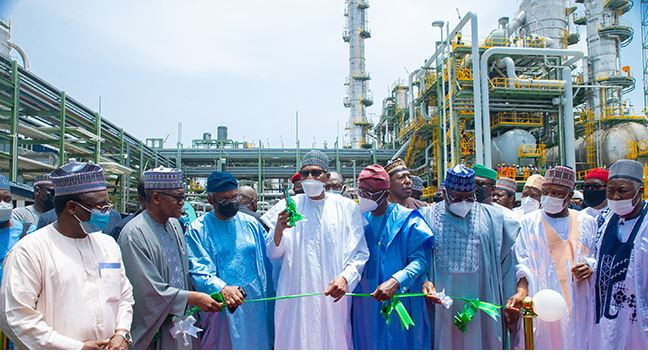- 6182
- 1
Sharing Ideas and Updates on LPG in Nigeria and related information to enable effective collaboration within the LPG Value Chain
The Transformative Potentials Of The Dangote Refinery For Nigeria's Energy Sector.

On Monday, May 22, 2023, the highly anticipated Dangote Refinery in the Lekki Free Trade Zone, Ibeju Lekki, Lagos, was officially commissioned.
The refinery would be Natural-Gas powered by a 435MW power plant, meaning a cleaner fuel other than diesel would be used to power this refinery. The refinery, which is a 650,000 barrels per day (bpd) integrated refinery project, is completely off the grid and has its own independent power plant (IPP).
The event was graced by esteemed dignitaries, including President Muhammadu Buhari, the outgoing President of the Federal Republic of Nigeria. This momentous occasion marked the commencement of operations for the refinery, which is expected to address Nigeria's longstanding challenge of limited indigenous oil processing capabilities.
Having been long awaited, LPG in Nigeria in this article aims to explore the transformative potentials of the newly commissioned refinery for the Nigerian energy sector.
LPG Production and Accessibility: The Dangote Refinery's increased production capacity is poised to address Nigeria's LPG supply-demand gap. By producing LPG locally, the refinery reduces the reliance on imports, ensuring a stable supply of this essential energy source. Improved accessibility and affordability of LPG are expected to follow, positively impacting households and businesses. The establishment of the refinery also acts as a catalyst for LPG infrastructure development, creating jobs and fostering economic growth.
Private Sector Access and Government Role: The private sector's involvement in the downstream sector is a key consideration. Experts advocate for private sector players to access petrol directly from the Dangote Refinery. This shift encourages market-driven dynamics, as the government relinquishes its role in downstream operations. By nurturing private sector businesses and adopting a regulatory framework, the government can support economic growth while benefiting from the refinery's impact on the sector.
Enhanced Efficiency and Clean Energy Promotion: The Dangote Refinery's impact extends beyond LPG production and private sector participation. The refinery's clean energy output promotes a transition from traditional biomass fuels to cleaner alternatives. With increased availability and affordability of LPG, the demand for polluting fuels like firewood and charcoal decreases. This shift leads to environmental and health benefits, including reduced deforestation and indoor air pollution. The refinery's export potential further contributes to Nigeria's economic growth.
Synergistic Integration: By bringing together these aspects, the Dangote Refinery acts as a transformative force in Nigeria's energy sector. It not only addresses infrastructure gaps and supply-demand challenges but also promotes private sector-driven growth and investment. The refinery's capacity and potential export capabilities position Nigeria as a dominant player in the regional market, generating revenue and enhancing its influence in Africa's oil and gas industry.
The Dangote Refinery's imminent commissioning marks a significant milestone for Nigeria's energy sector. Its impact on LPG production, private sector access, and the promotion of cleaner energy sources showcases the transformative potential of this refinery. By leveraging its capabilities, Nigeria can achieve self-sufficiency, enhance economic growth, and contribute to regional energy stability. As the government sets a strong regulatory framework and encourages private sector-driven initiatives, the Dangote Refinery's success serves as a model for fostering sustainable development in Nigeria's energy sector.
















SAGIR RABI U
23 March 2025 - 11:17pmHOW WORK
Reply